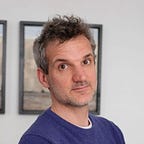Montaigne: The Pursuit of Virtue
There’s No Finish Line in the Race for Excellence. Enjoy the Race.
I once heard a priest who described himself not as a Christian, but as trying to be a Christian.
Whatever views we may have of Christianity, we understand the priest’s point. “Christian” to him was a superlative: a state of the highest order, not just simply believing in Christian doctrine.
The distinction between trying to be and claiming to be a state that is superlative was a great lesson for me. It allows us to understand that there is no finish line in the race for excellence. The great Renaissance essayist and philosopher, Michel de Montaigne, makes us think along similar lines.
It would be easy to say “I am virtuous” but it would also be disingenuous to myself and others. Saying or thinking such a thing feels more like a reassurance to ourselves. It’s more true to say that you are trying to be virtuous, since virtuous should be considered a superlative.
This is why it’s a bad idea to have heroes. Putting historical figures or celebrities on pedestals does an injustice to the values you assume they embody. It’s better to honour perfect values than to honour people and organisations that realise those values imperfectly.
